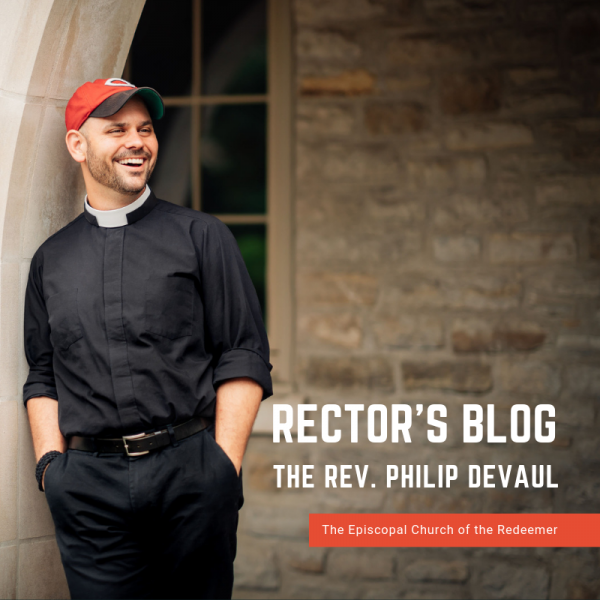Rector's Blog: Learning to See God's Story

Eschew Mediocrity. This was the sign that hung above the door in my high school Chemistry teacher's classroom. I loved it. Actually, I didn't know what it meant. I had to go look up "eschew". This was part of the reason I loved it - it challenged me. Mr. Effman didn't lower expectations or talk down to us. I found out "eschew" meant to "abstain from or avoid". Abstain from mediocrity. I was smitten. I mean, I was still completely mediocre at Chemistry. I did not eschew mediocrity in the sciences - apparently, I embraced it.
But of course, the phrase stuck with me. Isn’t this what we all want? To be remarkable: To avoid the commonplace. To excel in everything we do and in all that we touch. I’ve been talking a lot with my therapist about my desire to be remarkable. I don’t want to just do things – I want to be great at things. The pursuit of excellence is built into our cultural DNA, and it has pushed us to do some magnificent things as a culture.
But how does one excel at quarantine? How can I remarkably stay home? How can I eschew mediocrity while sheltering in place?
The eschewing of mediocrity has done a lot for us as a people, but it has not prepared us to be alone with ourselves. It has not prepared us to accept who we currently are, and right now, sheltering in place, who we currently are is one of the most real things we are experiencing. Living with who I actually am right now – not who I want to be or who I will become – but who I am in this moment is perhaps one of the most tangible aspects of this quarantine. How will I love myself and receive the love I need right now if I am not remarkable, if I am often quite mediocre, if I cannot achieve or perform, if I cannot eschew the norm, but would – given the chance – run with reckless abandon to wildly embrace something resembling normal? Hold that thought.
At Church of the Redeemer we are focusing this Easter season on The Way of Love - a set of seven Jesus-centered practices that comprise an Episcopal rule of life. These seven practices are titled: Turn, Learn, Pray, Worship, Bless, Go, Rest. We believe that a faithful engagement with these seven practices define the Episcopal experience of the Christian faith. My blogs, and our podcast – Interrupting Grace – are focusing directly on the seven practices of this Rule of Life and understanding how we can live into them right here and now – within the limitations of our current context. Because we believe that, while our lives have been interrupted, our faith has not been.
This week we are focusing on the Practice we call “Learn”. We describe this practice as reflecting on Scripture each day, especially on Jesus' life and teachings. In other words, reading the Bible daily, and focusing on Jesus as we do so.
As with all the practices in The Way of Love, the commitment to read Scriptures daily is not about self-improvement. This is especially important when it comes to the Bible because some of us were raised to believe reading and memorizing Bible verses was an Olympic sport. If we excelled at this we’d know more about God and were well on our way to a heavenly reward. Eschew mediocrity. People like us have a lot of baggage around knowing “enough” of the Bible or about the Bible and we have the tendency to turn Bible reading into just one more achievement.
The creators of The Way of Love describe the practice like this: By reading and reflecting on Scripture, especially the life and teachings of Jesus, we draw near to God and God’s word dwells in us. When we open our minds and hearts to Scripture, we learn to see God’s story and God’s activity in everyday life.
If we take this seriously, we shift our relationship with Scriptures away from what we hope to become someday, towards a recognition of how God is with us right now as we are. I cannot emphasize enough how essential this is to our lives right now. In times of uncertainty and fear, sickness and suffering, we don’t need to know how to become better people: We need to know where God is right now. The Bible tells us again and again that God is right here. With you. With me. In solidarity with the suffering. And working for our healing and recovery.
We are in need of the nourishment that Jesus brings into our daily lives by reminding us we belong to God and to one another. This doesn’t always feel obvious. The practice of reading the Bible nourishes us with God’s story. And God’s story is not about how we can eschew mediocrity. Nor is it about how we can embrace mediocrity. No, the Bible is the story of the God who obliterates our facile need to prove we are remarkable or to avoid being unremarkable. God is not interested in you being amazing. God is interested in you knowing you are loved. And God is inviting you to be a part of the story of that redeeming love, in Jesus’ name.
Tags: Rector's Blog